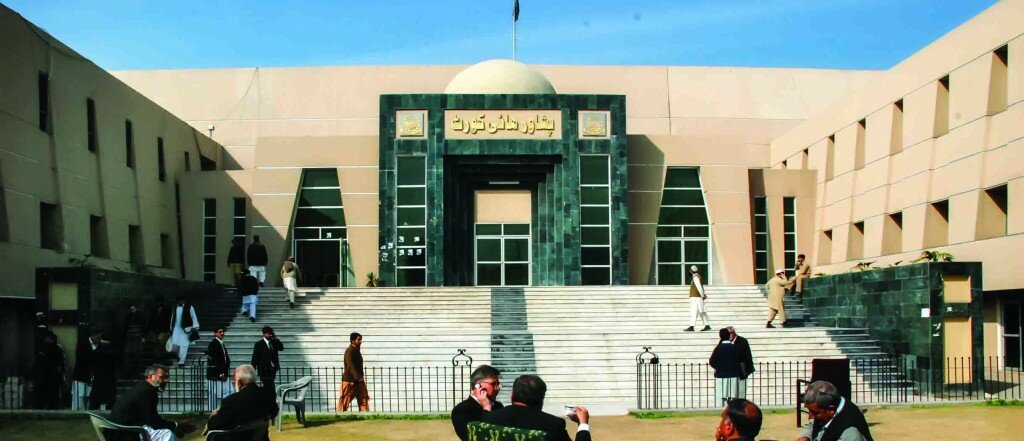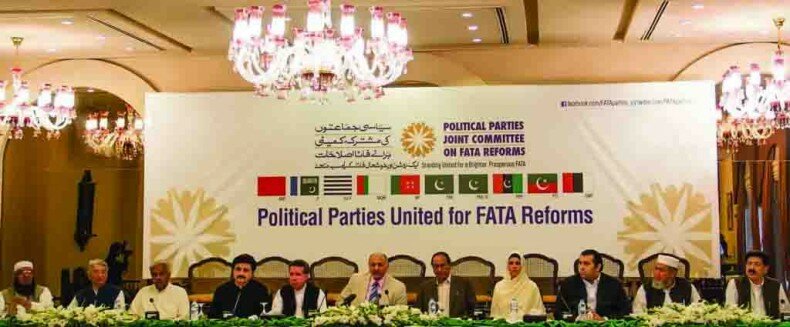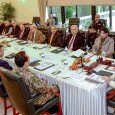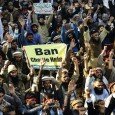By Shehryar Khurram –
The Federally Administered Tribal Areas (FATA), have historically been the most impoverished and least developed constituents of the country, with 60 per cent of the population currently living below the national poverty line. I used the word constituents in the least inclusive sense, as the laws used to govern what is colloquially called the tribal belt, are outdated, incompatible with modern ideas of citizenship and quite frankly, colonial and oppressive.
The area has become the epicenter of Islamic militancy in Pakistan. With a porous border adjoining Afghanistan, extremist groups of various nationalities and persuasions are holed up all over the different administrative agencies of FATA. But while the area might provide shelter to them, it isn’t home to just terrorists. In the recent clean-up operation initiated by the Pakistan military, no fewer than 800,000 people, citizens of Pakistan, have been exiled from their homes. This isn’t the first time they have become Internally Displaced People, and unless the state improves service delivery and equal citizenship to people in the tribal region, this won’t be the last.
For starters, since its inception FATA has yet to experience governance of the area by the residents themselves. The area is administered by government servants sitting far away, and policy matters are often decided for them without their consultation.
The pre-operation talks with the TTP is just one such example. The people of North Waziristan were neither consulted nor included in the negotiations. The subsequent backlash and now the brunt of the military action is also borne by the inhabitants of the area, not the negotiators or the administrators.
But the wounds go much deeper than this operation. At the heart of the matter is the inequality in citizenship between a resident of FATA and a resident of any of the other provinces in Pakistan.
Chapter 1 (Articles 8-28) of the Constitution guarantees certain fundamental rights to the citizens residing in any territory of the Islamic Republic of Pakistan. These rights include the security of person, the right to fair trial, freedom of movement, assembly, association, speech, and equality of citizens. Article 8 of the Constitution provides that any law, custom or usage which is inconsistent or in derogation of the fundamental rights is null and void.
In contrast to the spirit of the Constitution and the fundamental rights contained therein, there exists no judicial forum for the enforcement of these rights in FATA. Justice in FATA is dispensed through a quasi-judicial system in accordance with the provisions of a colonial law known as the Frontier Crimes Regulation (FCR) 1901. The FCR concentrates all judicial and executive powers in the office of the Political Agent/Deputy Commissioner, a senior civil servant of the federal government. In contravention of due process of law, citizens in FATA have no right to fair trial and have little safeguard against arbitrary arrest and detention.
Upon independence in 1947, the new state of Pakistan continued to be (mainly) governed under the Government of India Act 1935, which classified present day FATA in the category of ‘excluded or partially excluded areas’, which allowed the government to have a separate administrative framework for FATA. By virtue of this exclusion, the operation of the FCR continued in FATA, and all the subsequent constitutions of Pakistan have maintained similar devices and so denied the people of FATA the benefits of mainstream legislative and judicial processes in the country.
The FCR was promulgated in the erstwhile Northwest Frontier Province (NWFP) and the adjacent tribal areas in 1901 after administrative reforms which resulted in the separation of these areas from the province of Punjab and the creation of the new NWFP province. The FCR, 1901 was the third such regulation enacted in these areas.
The FCR is based on the principle of patronage, the ‘Maliki’ system, wherein the Malik of each sub-clan, clan and tribe is responsible for maintaining peace and providing protection to government interests in return for recognition and material benefits. The main objective of the FCR was and remains the suppression of crime and protection of the British Empire’s interests (now those of the Government of Pakistan); including keeping open the lines of communications with Afghanistan.
The FCR concentrates all administrative and judicial powers in the Deputy Commissioner (Political Agent), who deals with all civil and criminal disputes through a ‘council of elders’ commonly known as a Jirga. The Political Agent, however, retains the authority to make final decisions in all cases, civil and criminal. It is also important to note that the findings of the Jirga do not legally bind the Political Agent in any way.
The council of elders itself decides all cases according to customary tribal law. These laws can sometimes be incompatible with the fundamental rights guaranteed by the Constitution of Pakistan and propositioned by International Human Rights Standards. They can be extremely oppressive towards women, for example, denying them a right to inheritance and severely restricting their movement and labour, as would otherwise be protected under the laws of Pakistan.
Another important feature of the FCR is the principle of collective responsibility that allows an entire sub-clan, clan or tribe to be held responsible for the actions of one or more of its members. Under the FCR, the Political Agent is empowered to take several harsh measures against the entire tribe, including blockade, closing down businesses, and restricting movement. The FCR also grants wide discretion to the Political Agent under the infamous Section 40 to detain almost any member of a tribe if that person cannot provide a bond (guarantee) for ‘good behaviour’.
As such, the bond has to be to the satisfaction of the Political Agent. In the absence of any effective judicial oversight, this section essentially allows the Political Agent to imprison people at his discretion for up to three years at a time, though this is now technically subject to revision by the Commissioner and the FATA Tribunal following the 2011 amendments to the FCR.
But mere amendments can’t fix an inherently oppressive and discriminatory set of statutes. While recent governments have paid a lot of lip service to constitutional reforms in FATA and made an elaborate committee for this express purpose, no significant development has taken place in the last 3 years.
Perhaps the closest thing to immediate and real change was the bill moved (but not yet passed) by PPP Senator Farhatullah Babar seeking to include FATA in the judicial and administrative realm of Khyber Pakhtunkhwa (KPK).
Because of its geographical proximity to KPK, the people of FATA often approach the Peshawar High Court (PHC) for the enforcement of their fundamental rights, but the court itself says that under Article 247(7) of the Constitution, has no jurisdiction in areas that constitute FATA except in relation to the terms and conditions of service of the civil servants, development contracts and detentions that violate Section 86-A of the Criminal Procedure Code.
It would require only a simple majority (50 percent vote) in the Parliament to pass a bill for the extension of the jurisdiction of the PHC and Supreme Court in FATA. Furthermore, if the residents of FATA can currently visit the offices of the Commissioner or the FATA Tribunal in Peshawar for revision of cases under the FCR, no legal harm is foreseen in establishing a FATA Bench of the PHC.
Though long term reforms will still need to be implemented.
The FATA Reforms Ccommittee
Established in 2010, the Political Parties Joint Committee on FATA Reforms (also known as the FATA Committee) works together for constitutional reforms regarding the tribal areas. The political parties represented on the FATA Committee are ANP, JI, JUI-F, MQM, NP, PML-N, PML, PPP, PTI and QWP.

To make certain that tribal citizen voices are heard in the struggle for FATA reforms, the FATA Committee includes FATA parliamentarians and other political party members from inside the tribal areas. The FATA Committee also meets with citizen and civil society groups from FATA, including representatives of the 250-member FATA Grand Assembly. As part of the consensus-building process and discussions to arrive at new consensus reforms, the FATA Committee reviewed the Citizens’ Declaration for FATA Reforms (also known as the FATA Declaration), which was unanimously approved by the FATA Grand Assembly tribal Jirga.
- In December 2013, the ten political parties represented on the committee presented their formal resolution.
- Peace in FATA should be guaranteed.
- Article 247 of the constitution should be amended to guarantee fundamental rights for all tribal citizens and shift legislative power from the President of Pakistan to the parliament.
- Local bodies elections should be held in FATA.
- A comprehensive package should be developed for FATA and infrastructure development initiated, with special focus on health, education and employment.
- The future status of FATA should be decided by its people.
- Pakistan Electronic Media Regulatory Authority (PEMRA) jurisdiction should be extended and media should be provided greater access to FATA to provide tribal citizens with opportunities for media interaction and participation.
- The Jirga system should be made more democratic and independent.
- Actions in Aid of Civil Power Regulation should be abolished.
- Executive and judicial powers should be separated in FATA.
- Citizens should not be deprived of property; inheritance law should be extended.
- Civil armed forces (khasadar and levies) should be strengthened and professionalized.
Some good points, some redundant ones (peace in FATA cannot be guaranteed by a state still breeding militants in it), but the proof of the pudding is in the eating. Half a year has passed since this 11 point resolution was put forward, a military operation has started but still no reforms. Many of these political parties might not even sit at the same table again anytime soon, considering what’s been going on in Islamabad this past August.
It would be a terrible shame if political lip service and heavy handed military intervention is all FATA is destined to see for another few years. These people, these citizens, these human beings, deserve better.
The writer is a journalist based in Peshawar






























































































